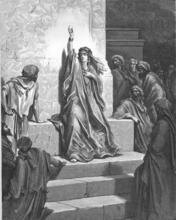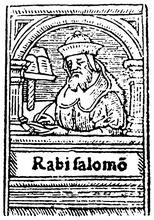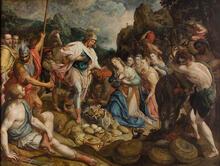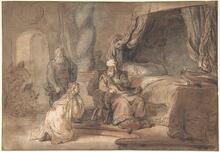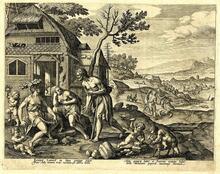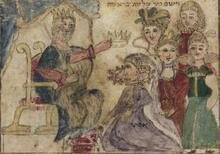Abigail: Midrash and Aggadah
The Rabbis depict Abigail as a wise and practical woman, capable of acting at the right moment and in the right way. They interpret her actions to mean that she is one of the few women prophets and describe her as extremely beautiful. She saves David from committing unnecessary bloodshed, while at the same time assuring her future. Abigail and David were suited for one another, and their marriage was ordained by Heaven. Instead of being based on political or economic considerations, her and David’s marriage was motivated by love and mutual appreciation, the roots of which were already planted the first time they met.
The Rabbis depict Abigail as a wise and practical woman, capable of acting at the right moment and in the right way. She saves David from committing unnecessary bloodshed, while at the same time assuring her future. This good woman and David were suited for one another, and their marriage was ordained by Heaven; it was not based on political or economic considerations, but rather on love and mutual appreciation, the roots of which had already been planted the first time they met.
Descriptions of Abigail
The Rabbis’ positive attitude to Abigail is evident from their deliberations about the number of wives that a king may take. The Torah she-bi-khetav: Lit. "the written Torah." The Bible; the Pentateuch; Tanakh (the Pentateuch, Prophets and Hagiographia)Torah (Deut. 17:17) mandates that the king “shall not have many wives,” which the Rabbis understood as limiting him to eighteen wives. In this context they add the proviso: “‘he shall not have many wives’—even though they be like Abigail” (M Sanhedrin 2:4). In other words, even if the king’s wives are blessed with good traits and are as righteous as Abigail, he may not take too many. Another view, however, understands that this prohibition is meant to prevent the king from leaving the path of the Lord. Consequently, if a person has wives like Abigail, there is no reason to limit the number of his spouses (T Sanhedrin 4:5; BT Bava Mezia 115a). Both approaches, regardless of the differences between their interpretations, highlight Abigail’s uniqueness: she is the only one of David’s wives mentioned in this context and she symbolizes positiveness and goodness.
The Rabbis include Abigail among the four most beautiful women who ever lived. The mere thought of her, even without seeing her, inspired lust (BT Lit. "scroll." Designation of the five scrolls of the Bible (Ruth, Song of Songs, Lamentations, Ecclesiastes, Esther). The Scroll of Esther is read on Purim from a parchment scroll.Megillah 15a). She is also mentioned among the seven women prophets of Israel (BT Megillah 14a). Although the Bible does not depict her as such, Abigail’s entreaty to David in I Sam. 25:24–31, which forecasts his military victory over his enemies and his future as king over Israel, was perceived as prophecy (Lit. "order." The regimen of rituals, songs and textual readings performed in a specific order on the first two nights (in Israel, on the first night) of Passover.Seder Eliyahu Rabbah 21). Since she was blessed with divine inspiration, the Rabbis learned of the afterlife from what Abigail pronounced. She tells David (v. 29): “the life of my lord will be bound up in the bundle of life,” from which the Rabbis derive that God bundles up the souls of the righteous with pleasure and honor (Sifrei Zuta on Numbers, 27:12).
David’s Murder of Nabal
The Rabbis tell how Abigail managed to conduct a weighty discussion with David. She came to him on a pretext, asking him to rule whether she was pure or impure after her menstruation. They deduce this from the verse (I Sam. 25:20): “She was riding on the ass and going down the covert of the mountain,” that is, she addressed him concerning covert things, namely, questions concerning menstruation. David told her: “Can blood be seen at night? Menstrual blood must be seen in the daylight!” Taking advantage of this opportunity, Abigail also responded on matters of “blood”: “Are capital cases judged at night? [David had come to kill her husband Nabal at night.] The decision in capital cases must be rendered in daylight!” David replied: “Since I am king and Nabal refuses my orders, he is deemed to be rebelling against the king, and as such may be put to death without a trial.” Abigail retorted: “Saul still reigns, and you are not the ruler. Your coin (matbea) bearing your name, declaring you to be king, has not yet been issued.” This argument won over David, and he conceded to Abigail (v. 33): “And blessed be your prudence” (BT Megillah 14a–b).
Saving David From Transgression
The similarity between the story of David and Abigail and the episode of David and Bathsheba did not escape the Rabbis, who viewed the nighttime encounter between David and Abigail as an event with adulterous potential. The Rabbis relate that Abigail’s thigh was revealed to David, he lusted after her and he went after her for three parasangs. David said to Abigail: “Heed me [i.e., lie with me]!,” to which she replied: “Do not let this be a cause of stumbling” (v. 31)—this should not be a stumbling block and a cause of transgression for you. David did indeed heed her and overcame his evil inclination. After this he blessed Abigail (v. 33): “and blessed be you yourself for restraining me from seeking redress in blood [damim].”
The Rabbis learn from the plural “damim” that she saved him from two transgressions: from committing bloodshed, and from having relations with her when she was menstrually impure (BT Megillah loc. cit.). This A type of non-halakhic literary activitiy of the Rabbis for interpreting non-legal material according to special principles of interpretation (hermeneutical rules).midrash depicts the young David as we know him later on in the episode of Bathsheba. David is captivated by a married woman and cannot overcome his passion. In this instance Abigail takes a determined stand against him, and thanks to her he is saved from sin. The balance of forces in this midrash is suitable for the Biblical situation, in which David has not yet ascended the throne: he has no possessions, and he flees for his life from Saul, while Abigail is a woman of high standing, established and powerful (whereas in the episode of David and Bathsheba this balance of forces is reversed).
The Sages learn from Abigail’s blessing to David: “Do not let this be a cause of stumbling [le-fukah]” (v. 31) that she prophesied to David that “this” would not be a stumbling block, but that another incident—with Bathsheba—would be his undoing (BT Megillah loc. cit.). The Rabbis understand from this that Abigail was a prophet (see above).
Abigail and David’s Marriage
Another tradition expounds fukah as “gossip [pikpukei devarim] was there.” Abigail told David: “You will rule all Israel. When the gossip about you goes forth, people will say that you are a murderer! And that is not all—you are about to sin with a married woman. It would be better for you to fall prey to this transgression once, and not twice” (JT Sanhedrin 2:3, 20b).
Before taking her leave of David, Abigail tells him (v. 31): “And when the Lord has prospered my lord, remember your maid.” The Rabbis respond to this with a popular saying: “While a woman talks she spins,” which praises woman’s ability to engage simultaneously in two activities that require one’s attention. Abigail was indeed blessed with this trait, characteristic of women. She engaged in her husband’s affairs and tried to save his life, while at the same time she wisely laid the foundation for the future, by asking that David favorably remember her for her actions. Some Rabbis apply another proverb to this: “The goose stoops as it goes along, but its eyes gaze afar.” This saying describes the nature of the goose to forage for food on the ground with stooped head, but at the same time its eyes, located on the sides of its head, look around to ensure that no danger lurks. Thus, Abigail engaged in the immediate concern (saving her family from David’s sword), while at the same time looking into the future and preparing her household accordingly (BT Megillah loc. cit.).
In yet another tradition, when Abigail bade David (v. 31): “remember your maid,” she was attracted to him—while she was still married to another. Consequently, her name appears in all the other sources in plene spelling: Avigayil אביגיל, while here her name is blemished, and she appears in v. 32 in defective spelling: Avigal אביגל (JT Sanhedrin 2:3, 20b).
According to the Rabbis, God brought about Nabal’s death because of his evil deeds. He was a deceiver like Laban; he corrupted his ways with incest; engaged in idolatrous thoughts; and in his heart he not only denied David’s kingship, but even denied God. Abigail, in marked contrast, was a good woman, of whom Proverbs (18:22) declares: “He who finds a wife has found good.” If David had killed Nabal and his household, he could have offered all the sacrifices in the world, but his iniquity would not have been pardoned, and Abigail rescued him from such a sin. She therefore was better for him than all the offerings in the world. God said: “Let the good one come and be for the good, and let the evil one go in his evil,” that is, let the good Abigail come and be the wife of the good David, while the wicked Nabal goes to die for his wickedness (Midrash Tehillim on Ps. 53:1).
As depicted in the Book of Samuel, David takes Abigail as a wife shortly after Nabal’s death. Abigail’s love for David knew no bounds, and David writes of this passionate love in his lament for Jonathan (II Sam. 1:26): “Your love was wonderful to me more than the love of women,” that is, than the love of two women, Michal and Abigail (Midrash Samuel 25:4).
In the midrashic account, after David married Abigail, he abstained from intercourse with her for three months, to learn if she was pregnant by Nabal. Only afterwards did they engage in relations, and she became pregnant by him. Nonetheless, the mockers of the generation said that this child was from Nabal. What did God do? He commanded the angel responsible for the creation of the fetus and its shape, telling him to form it in the countenance of David, so that all would know that he was the father. This son of David and Abigail was called Chileab (kilav), since David was wholly the father (kulo av). Whoever saw the child would say that David was his father (Tanhuma, Toledot 6).
In the late Midrash Abigail is listed among the twenty-three truly upright and righteous women who came forth from Israel (Midrash Tadshe, Ozar ha-Midrashim [Eisenstein], p. 474).
Brooks, Geraldine. The Secret Chord. Penguin, 2016.
Biala, Tamar, editor. Dirshuni: Israel Women Writing Midrash (Hebrew). First and Second Editions.
Shaked, Malka. לנצח אנגנך: המקרא בשירה העברית החדשה.
Shamir, Moshe. "Kivshat HaRash: Sippur Uriah HaHiti." Israel, Sifriat HaPoalim.
Reviewed in Jacobson, David C. Modern Midrash: The Retelling of Traditional Jewish Narratives by Twentieth-Century Hebrew Writers. SUNY Press, 2012.


